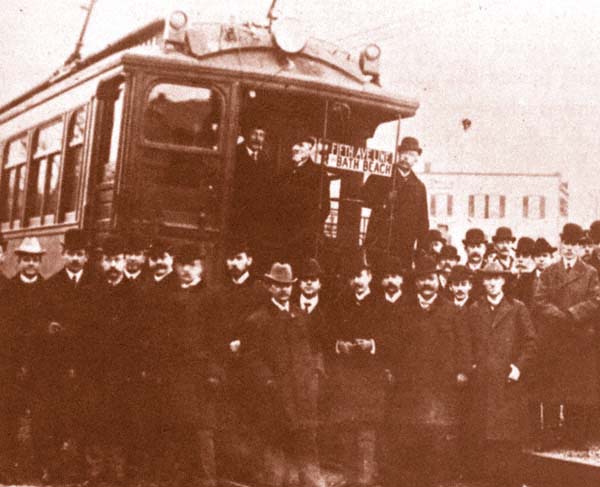
Gunther and His Railroad
by Morton
Morris
Page 5
There were indeed many
novelties connected with a trip to Coney Island in those days. On one
trip, I remember, a dispute arose between the conductor and the engineer.
When the train arrived as far as Unionville, the engineer left his cab,
and, surrounded by the interested passengers, the rivals settled their
dispute by a fist fight. After the engineer said that he had enough, all
hands boarded the train again and the remainder of the journey
commenced.
To be better fortified for one of
these trips, it was the regular custom for nearly all of the male
passengers, before starting on the long journey to Coney Island, to take a
drink of stimulants at the saloon in the depot at 25th Street and Fifth
Avenue. An engineer by the name of Maierhultz and his train crew one time
were in the saloon drinking and playing poker, awaiting for the time for
the train to start. There was too much money on the table when the gong
sounded announcing that it was time for the train to start. So they took
no notice of the clanging gong, but finished out the jackpot, the winning
man set up the drinks to the waiting passengers, the crew leisurely lit
their cigars, and then we all boarded the cars and started, some twenty
minutes later than the regular schedule time of
leaving.
After a few years of this sort of
service, Mr. Gunther bought two new engines, naming them after his sons,
Christ and George. Later he bought two more, naming them after his two
daughters, Meme and Maud. A few years later he added two more and called
them Sentinel and Clifford.
Always in
the spring of the year the old engineers would come around and apply for
their old positions. Each engineer took a personal pride in the engine
over which he had control, and was allowed the privilege each spring of
painting his own engine according to his own
ideas.
There was one engineer who had served
in the war of the rebellion, and who was particularly patriotic, who
painted his engine red, white and blue.
Gunther saw it from a distance, on its first trip, tearing across the
country, and he was frantic.
"For God's sake,
Drummond," he said, when he overtook his engineer, "whatever possessed you
to paint that engine red, white and blue?'
"You're a true American, ain't you?" said
Drummond.
"Yes,
but-but-"
"Well, so am
I."
"Yes, but that engine looks like a
traveling barber shop."
Gunther could not
convince Drummond, however, and the latter quit his job rather than submit
to any alterations.
The engine was afterwards
painted according to Mr. Gunther's ideas.
It
was painted a flaring yellow.
Drummond was one
of the most popular men, however, ever on the line and it was only a
matter of time before Gunther took him back into his
employ.
Many of the residents along the line
used to get Drummond to buy various things in the city for them, thereby
saving them a long trip. in this way and others he began to make
considerable money, and each day, after his last run, he would have quite
an elaborate supper spread before him at the old Tivoli Hotel, at Coney
Island, which he would relish while he made up his daily cash
report.
One night while Drummond was in the
midst of his feast, Gunther came along and saw him. He was dumbfounded,
and some hot words passed.
"Drummond," said
Gunther, "I believe that as a conductor you are making more money out of
this railroad than I am as its owner."
"Look here, Gunther,"
said Drummond, "you tell me how much money you want
for your railroad. I'll buy it from you. Then I'll hire you to work
for me and give you a chance to get your money
back."

This picture marks the final end of
Gunther's era on the West End. The first electric train from the Fifth
Avenue L arrives, with everyone getting in the picture.
Paul Matus Collection.
* * *
Link: Bits of Old New Utrecht Road from Gunther's era survive today.
* * *
Copyright © 1974 by Third Rail Press, © 1999
by The Composing Stack Inc.
Reprinted by permission. Not
responsible for typographical errors.
The Third Rail and The Third Rail logo are trademarks of The Composing Stack Inc.
Return to The Third Rail Online Home
Return to
rapidtransit.net Home
Everything on this site is copyright © 1999 by The Composing
Stack Inc., except as otherwise noted.
Materials
with other copyrights are used by permission.
All
rights reserved
Last updated December 25, 1999